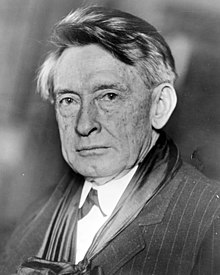
Back توماس إي. واتسون Arabic توماس اى. واتسون ARZ توماس ئی. واتسون AZB Thomas E. Watson (Politiker) German Thomas E. Watson Spanish توماس ئی. واتسون Persian Thomas E. Watson Hungarian Thomas E. Watson Polish Thomas E. Watson Swedish
Thomas E. Watson | |
|---|---|
 Watson, c. 1920s | |
| United States Senator from Georgia | |
| In office March 4, 1921 – September 26, 1922 | |
| Preceded by | Hoke Smith |
| Succeeded by | Rebecca Latimer Felton |
| Member of the U.S. House of Representatives from Georgia's 10th district | |
| In office March 4, 1891 – March 3, 1893 | |
| Preceded by | George Barnes |
| Succeeded by | James C. C. Black |
| Personal details | |
| Born | Thomas Edward Watson September 5, 1856 Thomson, Georgia, U.S. |
| Died | September 26, 1922 (aged 66) Washington, D.C., U.S. |
| Political party | Democratic (Before 1892, 1920–1922) Populist (1892–1909) |
| Spouse | Georgia Durham |
| Education | Mercer University |
Thomas Edward Watson (September 5, 1856 – September 26, 1922) was an American politician, attorney, newspaper editor, and writer from Georgia. In the 1890s Watson championed poor farmers as a leader of the Populist Party, articulating an agrarian political viewpoint while attacking business, bankers, railroads, Democratic President Grover Cleveland, and the Democratic Party. He was the nominee for vice president with Democrat William Jennings Bryan in 1896 on the Populist ticket.
Elected to the United States House of Representatives in 1890, Watson pushed through legislation mandating Rural Free Delivery, called the "biggest and most expensive endeavor" ever instituted by the U.S. Postal Service. Politically, he was a leader on the left in the 1890s, calling on poor whites and poor blacks to unite against the elites. After 1900, he shifted to nativist attacks on blacks and Catholics, and after 1914 on Jews. He was elected to the United States Senate two years before his death, dying in office.